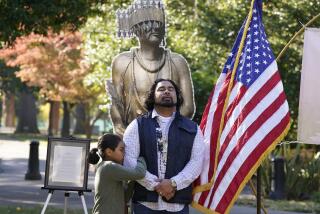Cambodia Land-Grab Threatens Peace, Stability
- Share via
BLANG, Cambodia — Sev Hev’s cashew grove has been reduced to charred branches and scorched earth -- part of 1,100 acres that he and neighboring villagers contend were illegally sold to a company for a rubber plantation without their knowledge.
The father of five says his family’s future is as bleak as his splintered trees. “We have nothing to rely on.”
Across Cambodia, from remote Ratanakiri province in the northeast to the rice-growing regions of the northwest, land-grabbing is threatening peace and social stability.
About 85% of the country’s 13 million people farm, and many of them live on plots whose ownership is unclear or disputed. Most land records were destroyed by the murderous Khmer Rouge in the late 1970s.
After neighboring Vietnam ousted the Khmer Rouge in 1979, families settled on state land allocated to them. Then the Vietnamese left and Cambodians generally moved where they pleased.
A land law enacted in 2001 to end ownership disputes failed to curb the conflicts, which are intensifying as companies win logging concessions, re-plant farmland or speculate in land earmarked for public works.
Prime Minister Hun Sen has said hundreds, even thousands, of families have been evicted in land takeovers. He warns that Cambodia could suffer a “peasant revolution” if land isn’t redistributed to the poor. The World Bank estimates the number of Cambodians living on $1 or less a day grew to nearly 43% last year from 37% in 1996.
Peter Leuprecht, U.N. special envoy on human rights in Cambodia, said it was always dangerous when large numbers of people thought they had nothing to lose. In Cambodia, “you have more and more such people,” he said.
Leuprecht charged that authorities often abet the illegal sales, and Hun Sen acknowledged that powerful government officials had been involved in land-grabbing.
Illegal or not, about 6.7 million acres, or almost 15% of Cambodia, belong to concessions granted to private companies for forestry, agriculture, mining, tourism and fishing, according to a report issued by Leuprecht in November.
The potential for trouble was illustrated on Nov. 13, when villagers in the western province of Pursat blocked a road to stop a company from logging a large forest they had used to support themselves. Six protesters were hurt when someone threw a grenade at them. The area remains restive.
World Bank country manager Nisha Agrawal said her agency found that up to 80% of Cambodian court cases involving the poor involved land disputes.
“If we care about the poor, if we care about rural economic growth, and if we care about justice, we must care greatly about land,” she said in October.
The people of Sev Hev’s home village of Blang and neighboring Kong Youk are Jarai, a minority hill tribe who worship spirits they believe live in the forest.
Cambodian hill tribes grow crops on idyllic plots of land reached by walking under canopies of bamboo trees or across wobbly wooden poles. They speak their own languages and live differently from most Cambodians, who are Buddhists.
Many don’t speak Khmer, the national language, and don’t know what protections the law provides.
The Kong Youk villagers say they were duped several months ago by a local leader who told them the military needed 12 acres of their land.
They say they agreed, provided they got to keep the rest of their 1,100 acres.
However, they learned in late August that all their land -- including some belonging to Blang and another village -- had been sold to a group planting rubber trees. They said each of Kong Youk’s 61 families was compensated with $400.
Hom Sary, who claims to own the land with a group of partners, tells a different story. He says villagers and local authorities approved the deal. He denies burning Sev Hev’s cashew grove and says the villagers reneged on the deal.
“First, the villagers urge me to buy their land. When they get my money, they complain and demand their land back,” he said.
Tractors and workers have cleared nearly 500 acres, some of it active farmland, since November. About 20 families in Kong Youk who don’t accept the land sale have gone to the clearing area in recent weeks and started planting. They haven’t had a problem yet.
One of them is Sev Pgnak, a widow living in Kong Youk. The cashew trees that supported her five children were cut down.
“I know nothing about how to earn money to support my life if the land is lost,” she said. “If my land belongs to someone else, my family will die.”
More to Read
Sign up for Essential California
The most important California stories and recommendations in your inbox every morning.
You may occasionally receive promotional content from the Los Angeles Times.













